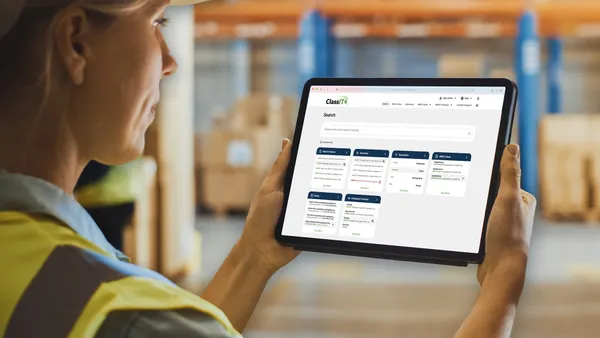Dive Brief:
- If blockchain is going to succeed in supply chain, it cannot rely on the same standards set for banking and finance applications, Gartner said in a new report. Following practices set by other industries could result in many supply chain blockchain projects remaining in the pilot phase until 2022, the report found.
- Supply chain applications need data on physical products and transportation assets across multiple tiers of operation. Figuring out what data is needed is an important first step to making blockchain a reality, Gartner explained in a press release.
- Gartner's report suggests blockchain implementation will require more testing than some organizations might have originally expected. But this process can result in a better understanding of the supply chain. "By going through the process of deploying a blockchain pilot, [supply chain leaders] discovered what needs to change in their organization before blockchain technology can be leveraged effectively," Andrew Stevens, a senior research director with Gartner, said in a statement.
Dive Insight:
Blockchain by its nature requires data sharing, but getting several companies to use the same, new technology platform isn't easy.
In part, the challenge lies in the fact that blockchain standards are still fairly nonexistent. "We're very much in that discovery phase," Stevens said. And this means companies will have to work harder to understand how to use the technology within their organizations in a beneficial way.
TradeLens, a blockchain initiative started by Maersk and IBM, is one example of supply chain partners trying to tackle the collaboration concern. The efforts started with ocean carriers and ports and has since spread to rail. TradeLens said the technology will improve "end-to-end shipment tracking capability," according to a press release announcing CSX joining the group.
Ford also announced plans last year, in partnership with IBM, to track cobalt from the Democratic Republic of Congo via blockchain with participation from its partner companies at every step of the supply chain.
Gartner's blockchain report comes less than a year after the firm suggested supply chain blockchain projects were suffering from "fatigue." It blamed the exhaustion on immature technology, a need for standards and a general misunderstanding of the technology, Gartner said last year.
"But certainly a lot of the feedback that I've started to get now is that although the results have been variable, there are some positive indicators in terms of the fact that the core premise of blockchain is really around having very secure protocols where you enable rules of engagement across specific supply chain trading partners," Stevens said in an interview with Supply Chain Dive.
So while the technology might not be ready, testing it gives companies a better understanding of their supply chain and partners. It could also help them better understand their technology infrastructure.
"Increasingly what we're finding is that instead of perhaps blockchain being looked at in isolation, as kind of an all-encompassing platform, it's being looked at alongside all of those other technologies," Stevens said.
Pilots can help organizations realize that a different technology can fix the problem or lead to the understanding that blockchain is just one part of a larger and longer term technology roadmap. Internet of Things technology is one alternative that can similarly provide a company visibility and "greater levels of governance over their assets and products," he said.
Blockchain still has a place in supply chain, but it's difficult to implement right now. It's hard to turn to examples of best practices when a technology is this new, so companies might have to test multiple solutions before figuring out the best approach, according to Gartner. However the technology could still prove beneficial for verifying the authenticity of goods, improving traceability and increasing transactional trust, Gartner found last year.
"There may well be a tendency to perhaps withdraw given the very variable results that have been conspiring, but this is still very much an optimum period for discovery," Stevens said.















